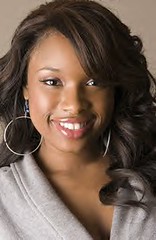
The beautiful and talented Jennifer Hudson steals the screen in Dreamgirls. Hudson plays a role that reviewers say resembles aspects of the life of former Supreme Florence Ballard.
Originally uploaded by Pan-African News Wire File Photos.
By Abayomi Azikiwe, Editor
Pan-African News Wire
Jennifer Hudson triumphs over all in the recently released film Dreamgirls, which co-stars Beyonce Knowles, Eddie Murphy, Jamie Fox, Anika Noni Rose and Danny Glover. Having been unfairly snubbed by British co-host of American Idol, Simon, she has reached heights in her movie debut that could have never been achieved as the winner of American Idol.
Hudson ostensibly portrays a character that resembles the life and career of Florence Ballard, the founder and original lead singer of the famed Motown all-women's group, the Supremes. Ballard was eventually sidetracked as lead singer by Diana Ross and was fired from the legendary Supremes in 1967.
However, despite some similarities to the Supremes and Motown Records, the Dreamgirls story line diverges tremendously from the actual history of the Detroit-based record company that enjoyed dozens of hits which influenced the course of popular music during the 1960s and 1970s. In fact the story could be applicable to many of the all-women groups of the period from various cities including New York and the west coast.
Other characters in the film, such as the singer played by Eddie Murphy has features that resemble the careers of Jackie Wilson, Marvin Gaye and little tatse of James Brown. Jamie Foxx, who critics say resembles Motown founder Berry Gordy, Jr., takes on characteristics far removed from the record magnate's actual personal history.
For example, Gordy never sold automobiles on Woodward avenue in Detroit. He had worked in the auto plants and internalized aspects of the industry's approach to mass production in order to apply these ideas to the development of Motown Records. The famous African-American car dealer during the pre-civil rights era was Ed Davis, who eventually wound up as an official with the Detroit transportation department.
Although some clips of the historic "Walk to Freedom," the first mass demonstration for civil rights and social justice in the United States, which took place in Detroit in June of 1963, two months prior to the March on Washington, was featured in the film, overall there was limited reference to the real history of black Detroit. The rebellions of July 1967 was also touched on in the film, but no background information on race relations leading up to the largest outbreak of racial violence up until that time period, was brought out in the Hollywood movie.
What makes the departure from the actual life of Florence Ballard so striking is the triumph of Jennifer Hudson's character, Effie, over the problems with the black-owned recording firm. One could assume that the career of Effie would not only regain its stature but even transcend that of the other Dreams, the fictional girl group portrayed in the film. Unfortunately, Florence Ballard died of heart ailments at the age of 32 after facing major roadblocks in building an independent recording career with ABC after signing a contract with them in 1968.
Current Detroit City Councilwoman, Martha Reeves, who is the lead singer for the Vandellas, another all-women's Motown group of the period, which had hits long before the meteroic rise of the Supremes, was quoted in the local papers as being critical of the film's portrayal of the character which resembles Berry Gordy played by Oscar-winner Jamie Foxx. However, the screenwriters take such vast liberties in creating their own fictional storyline that one can overlook the excesses of Curtis Taylor, Jr., the black record company owner, as being merely a story which adds intense drama to the film.
What is also positive about the film is that the music is great. It is not the music of Motown. It resembles the musical themes developed by the Motown writers such as Holland-Dozier-Holland, Smokey Robinson, Norman Whitefield and even Berry Gordy, Jr., not to mention the instrumentation of the so-called "Funk Brothers," but it is largely original in focus because it updates and "modernizes" the rhythms and chord changes to appeal to young people influenced by the post-Motown genres of music.
With the success of Dreamgirls, this writer hopes that there will be more all-African casts in commercial Hollywood films that enjoy wide distribution. Whether these films examine cultural themes or political issues, it is a welcome contribution to see the beauty of African-American popular culture and its treatment as an art form with lasting historical significance.
--------------------------------------------------------------------------------------------
Abayomi Azikiwe is the editor of the Pan-African News Wire. His opinions are frequently sought by media outlets in print, television and radio. He has worked as a broadcast journalist for the last eight years as well with radio programs on five different stations in Detroit and Toronto. His commentary can be heard on WDTW, AM 1310 in Detroit every Sunday from 10:00-11:00 a.m. In addition, he broadcasts on CKLN, FM 88.1 in Toronto every Thursday from 9:30-10:00 p.m.
-------------------------------------------------------------------------------------------
1 comment:
I have not seen the film yet, but I was lucky enough to be working in the entertainment press in Boston on the night that "Dreamgirls" opened for out-of-town tryouts. So I got to see/hear Jennifer Holliday sing that amazing song live for the first time! So many years later, I still remember the power of that performance.
Post a Comment